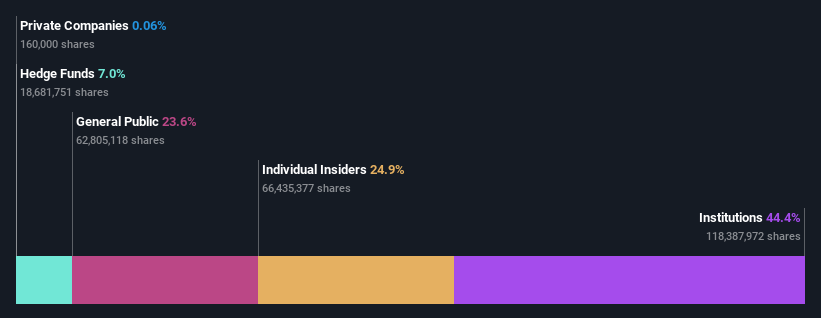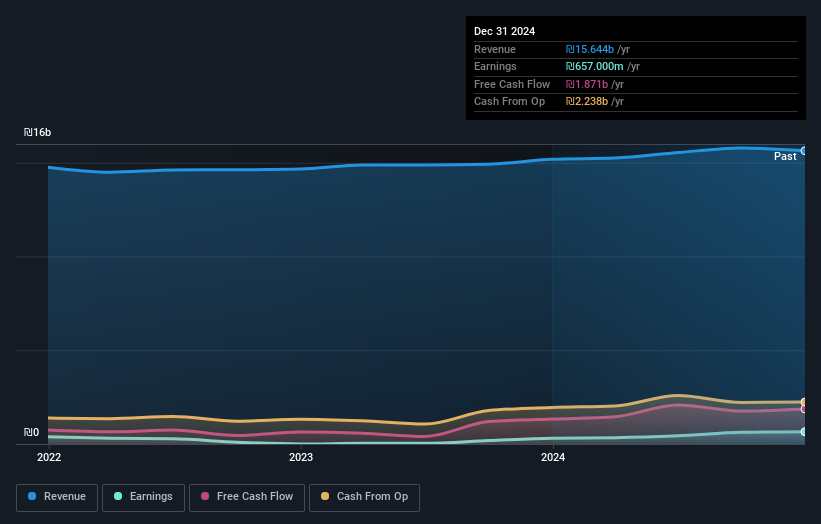- Israel
- /
- Food and Staples Retail
- /
- TASE:SAE
Institutional investors in Shufersal Ltd (TLV:SAE) see ₪506m decrease in market cap last week, although long-term gains have benefitted them.

Key Insights
- Given the large stake in the stock by institutions, Shufersal's stock price might be vulnerable to their trading decisions
- 53% of the business is held by the top 6 shareholders
- Insider ownership in Shufersal is 25%
A look at the shareholders of Shufersal Ltd (TLV:SAE) can tell us which group is most powerful. The group holding the most number of shares in the company, around 44% to be precise, is institutions. Put another way, the group faces the maximum upside potential (or downside risk).
Institutional investors endured the highest losses after the company's market cap fell by ₪506m last week. However, the 47% one-year return to shareholders might have softened the blow. They should, however, be mindful of further losses in the future.
In the chart below, we zoom in on the different ownership groups of Shufersal.
See our latest analysis for Shufersal

What Does The Institutional Ownership Tell Us About Shufersal?
Institutional investors commonly compare their own returns to the returns of a commonly followed index. So they generally do consider buying larger companies that are included in the relevant benchmark index.
As you can see, institutional investors have a fair amount of stake in Shufersal. This suggests some credibility amongst professional investors. But we can't rely on that fact alone since institutions make bad investments sometimes, just like everyone does. When multiple institutions own a stock, there's always a risk that they are in a 'crowded trade'. When such a trade goes wrong, multiple parties may compete to sell stock fast. This risk is higher in a company without a history of growth. You can see Shufersal's historic earnings and revenue below, but keep in mind there's always more to the story.

It looks like hedge funds own 7.0% of Shufersal shares. That's interesting, because hedge funds can be quite active and activist. Many look for medium term catalysts that will drive the share price higher. The company's CEO Yosef Amir is the largest shareholder with 12% of shares outstanding. For context, the second largest shareholder holds about 12% of the shares outstanding, followed by an ownership of 7.9% by the third-largest shareholder.
We did some more digging and found that 6 of the top shareholders account for roughly 53% of the register, implying that along with larger shareholders, there are a few smaller shareholders, thereby balancing out each others interests somewhat.
While it makes sense to study institutional ownership data for a company, it also makes sense to study analyst sentiments to know which way the wind is blowing. As far as we can tell there isn't analyst coverage of the company, so it is probably flying under the radar.
Insider Ownership Of Shufersal
The definition of company insiders can be subjective and does vary between jurisdictions. Our data reflects individual insiders, capturing board members at the very least. Management ultimately answers to the board. However, it is not uncommon for managers to be executive board members, especially if they are a founder or the CEO.
Most consider insider ownership a positive because it can indicate the board is well aligned with other shareholders. However, on some occasions too much power is concentrated within this group.
Our most recent data indicates that insiders own a reasonable proportion of Shufersal Ltd. It has a market capitalization of just ₪8.9b, and insiders have ₪2.2b worth of shares in their own names. That's quite significant. Most would say this shows a good degree of alignment with shareholders, especially in a company of this size. You can click here to see if those insiders have been buying or selling.
General Public Ownership
The general public-- including retail investors -- own 24% stake in the company, and hence can't easily be ignored. While this size of ownership may not be enough to sway a policy decision in their favour, they can still make a collective impact on company policies.
Next Steps:
I find it very interesting to look at who exactly owns a company. But to truly gain insight, we need to consider other information, too. Consider risks, for instance. Every company has them, and we've spotted 1 warning sign for Shufersal you should know about.
Of course this may not be the best stock to buy. So take a peek at this free free list of interesting companies.
NB: Figures in this article are calculated using data from the last twelve months, which refer to the 12-month period ending on the last date of the month the financial statement is dated. This may not be consistent with full year annual report figures.
New: Manage All Your Stock Portfolios in One Place
We've created the ultimate portfolio companion for stock investors, and it's free.
• Connect an unlimited number of Portfolios and see your total in one currency
• Be alerted to new Warning Signs or Risks via email or mobile
• Track the Fair Value of your stocks
Have feedback on this article? Concerned about the content? Get in touch with us directly. Alternatively, email editorial-team (at) simplywallst.com.
This article by Simply Wall St is general in nature. We provide commentary based on historical data and analyst forecasts only using an unbiased methodology and our articles are not intended to be financial advice. It does not constitute a recommendation to buy or sell any stock, and does not take account of your objectives, or your financial situation. We aim to bring you long-term focused analysis driven by fundamental data. Note that our analysis may not factor in the latest price-sensitive company announcements or qualitative material. Simply Wall St has no position in any stocks mentioned.
About TASE:SAE
Shufersal
Operates a chain of supermarkets under the Shufersal brand name in Israel.
Solid track record, good value and pays a dividend.
Market Insights
Community Narratives



